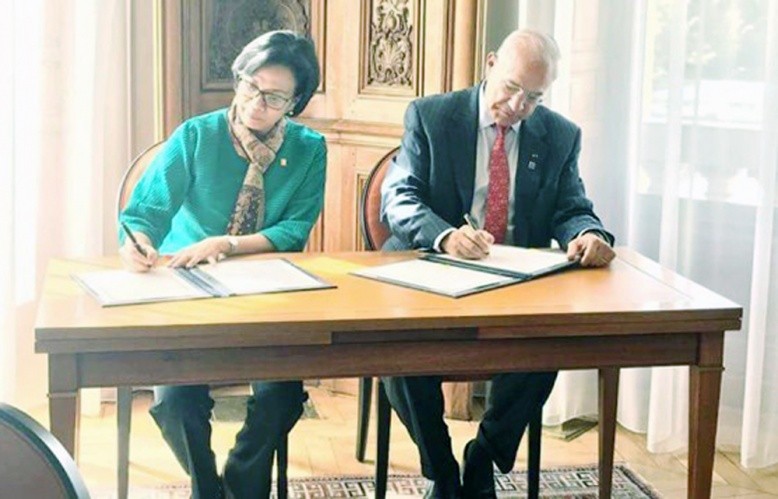Popular Reads
Top Results
Can't find what you're looking for?
View all search resultsPopular Reads
Top Results
Can't find what you're looking for?
View all search resultsA turning point in Indonesia’s tax treaty history
Ratifying the MLI reflects Indonesia’s commitment to combat tax base erosion due to the improper use of tax treaties.
Change text size
Gift Premium Articles
to Anyone
 Done deal: Finance Minister Sri Mulyani Indrawati (left) and Organization for Economic Cooperation and Development (OECD) secretary-general Angel Gurria sign a multilateral instrument on tax treaties at the OECD headquarters in Paris. Through the MLI, Indonesia aims to combat tax base erosion due to the improper use of tax treaties. (Courtesy of Sri Mulyani Indrawati/-)
Done deal: Finance Minister Sri Mulyani Indrawati (left) and Organization for Economic Cooperation and Development (OECD) secretary-general Angel Gurria sign a multilateral instrument on tax treaties at the OECD headquarters in Paris. Through the MLI, Indonesia aims to combat tax base erosion due to the improper use of tax treaties. (Courtesy of Sri Mulyani Indrawati/-)
A
ccording to the Organization for Economic Cooperation and Development (OECD), US$100 billion to $240 billion is lost to tax avoidance every year through the abuse of legal loopholes, or 4 to 10 percent of the world tax revenue.
On a global scale, multinational corporations (MNCs) use tax planning strategies that exploit legal gaps and mismatches in tax rules to artificially shift profits to low or no tax locations where there is little or no economic activity, so they pay little to no corporate tax.
Taxpayers can take aggressive tax planning measures by accessing certain tax treaties that provide lower rates or tax exemptions, one way of which is to create an “intermediate company” in the relevant country. A tax treaty is basically agreed to avoid double taxation by allocating taxing rights, as well as to increase economic cooperation.
However, taxpayers often use the facilities offered in tax treaties to avoid paying tax altogether, a practice that is called “treaty shopping”.
The government on Nov. 12, 2019, ratified the Multilateral Convention to Implement Tax Treaty Related Measures to Prevent Base Erosion and Profit Shifting (MLI) through Presidential Regulation No. 77/ 2019. Ratifying the MLI reflects Indonesia’s commitment to combat tax base erosion due to the improper use of tax treaties.
The government, along with 78 other countries, signed the MLI on June 7, 2017, in Paris as part of a global effort to implement the entirety of the international base erosion and profit shifting action plan related to tax treaties.
The MLI will enter into force within three months after Indonesia submits its instrument of ratification to the OECD.

















